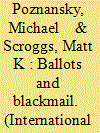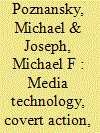|
|
|
Sort Order |
|
|
|
Items / Page
|
|
|
|
|
|
|
| Srl | Item |
| 1 |
ID:
151281


|
|
|
|
|
| Summary/Abstract |
Does the restraint that prevents pairs of democracies from fighting large-scale wars also prevent them from coercing one another? While scholars have long drawn a bright line between using force and threatening it, the literature on democratic-peace theory overwhelmingly emphasizes the former. Using a dataset uniquely suited for the study of militarized compellent threats, we find that pairs of democracies are significantly less likely to engage in coercive diplomacy than are other types of regimes. We employ a variety of estimators to ensure the robustness of our results; the finding holds in all cases. We also elaborate on several alternative logics that might account for the hypotheses. This allows us to adjudicate between a variety of mechanisms. Our findings reveal that democratic-peace theory has broader applicability than even proponents give it credit for: not only are democracies less likely to fight wars with one another, but they also prove less likely to threaten each other with force.
|
|
|
|
|
|
|
|
|
|
|
|
|
|
|
|
| 2 |
ID:
165435


|
|
|
|
|
| Summary/Abstract |
Why do leaders sometimes turn to covert action when overthrowing foreign regimes? Many scholars locate secrecy's appeal in its capacity to help control escalation dynamics or shield vulnerable politicians from domestic audience costs. This article instead identifies international law as the main determinant of covert regime change. I argue that leaders are more likely to pursue secrecy when they lack a legal exemption from the nonintervention principle, such as a credible self-defense claim or authorization from an international body. Brazen violations of nonintervention invite hypocrisy costs and damage a state's credibility. Leaders are more likely to choose overt action when one or more legal exemptions are available. I test my argument against two cases of US-led regime change in the Cold War, one covert and one overt: the Bay of Pigs and the invasion of Grenada, respectively. This article advances debates on political secrecy, international law, and the future of the liberal order.
|
|
|
|
|
|
|
|
|
|
|
|
|
|
|
|
| 3 |
ID:
159747


|
|
|
|
|
| Summary/Abstract |
States wishing to use force in the modern era frequently face strong incentives to exploit secrecy. Successful covert operations can reduce the likelihood of unwanted escalation with powerful rivals and help leaders conceal unpopular actions from domestic and foreign audiences alike. The many benefits of secrecy, however, can only be realized if covert operations remain covert. We argue that access to information and communications technologies (ICTs) is a critical factor that increases the chances that a covert mission will be exposed. As a result, leaders are much less likely to reach for the quiet option when a potential target has dense ICT networks. We illustrate our mechanism through US national security archival vignettes. We test our argument using a dataset of declassified US military and electoral interventions intended to subvert incumbent regimes throughout the Cold War. The core finding, that leaders are less likely to pursue covert action relative to alternative options when the chances of exposure are high, holds across five distinct measures of ICT networks as well as different model specifications and placebo tests. Our findings suggest that Cold War-style covert operations may well be a thing of the past in an age where communication and media technologies have proliferated to the far corners of the globe. We advance debates on communications technologies, covert action, and political violence.
|
|
|
|
|
|
|
|
|
|
|
|
|
|
|
|
| 4 |
ID:
181027


|
|
|
|
|
| Summary/Abstract |
Overt interventions to forcibly promote regimes abroad are often a risky undertaking. If successful, they can replace or rescue regimes and signal resolve in the process. But open meddling can also trigger large-scale escalation, incite nationalist backlash, and harm a state’s reputation. Despite an emerging consensus that states often prefer covert action to avoid these liabilities, leaders sometimes opt for overt action anyway. Why? Drawing on the concept of loss aversion, this article argues that leaders’ tolerance for risk differs depending on whether the goal is to overthrow a foreign regime or prop one up. Because regime rescue approximates loss prevention, leaders are more likely to pursue risky intervention strategies than they are to change regimes, a prospective gain. This framework helps explain why leaders are more likely to accept the risks of overt action when saving a foreign regime and more likely to go covert when deposing one. I evaluate this theory using the Eisenhower administration’s covert regime change efforts in Syria (1956–57) and overt regime rescue attempts in Lebanon (1958).
|
|
|
|
|
|
|
|
|
|
|
|
|
|
|
|
| 5 |
ID:
162761


|
|
|
|
|
| Summary/Abstract |
Cyberspace affords actors unprecedented opportunities to carry out operations under a cloak of anonymity. Why do perpetrators sometimes forgo these opportunities and willingly claim credit for attacks? To date, the literature has done little to explain this variation. This article explores the motivations behind voluntary credit-claiming for the two main actors in cyberspace: states and politically motivated nonstate actors. We argue that states are most likely to claim credit for their operations and to do so privately when the goal is to coerce an opponent. Nonstate actors tend to publicly claim credit for their attacks in order to showcase their capabilities, influence public opinion, and grow their ranks. We use case narratives to assess the plausibility of our argument and find strong support. This article places cyberspace operations in conversation with the larger literature on secrecy in international relations and advances a common framework for understanding how both states and nonstate actors operate in this evolving domain.
|
|
|
|
|
|
|
|
|
|
|
|
|
|
|
|
| 6 |
ID:
186096


|
|
|
|
|
| Summary/Abstract |
Despite its prominence as a tool of statecraft, covert action’s defining characteristic – plausible deniability – remains a slippery concept. This article investigates the logics underlying the two main variants. The first ideal-type, the state model, captures efforts by states to disclaim sponsorship of covert operations. The drivers of covert action are primarily international, the sources of exposure are many, and its relationship with democratic norms is harmonious. The second ideal-type, the executive model, describes efforts to shield chief executives from blame. The drivers of covert action are domestic, the sources of exposure are limited, and its relationship with democracy is conflictual.
|
|
|
|
|
|
|
|
|
|
|
|
|
|
|
|
| 7 |
ID:
146162


|
|
|
|
|
| Summary/Abstract |
Democratic states sometimes engage in covert interventions—sometimes involving forcible regime change—against other democracies. Critics charge that these interventions raise doubts about the robustness of the “democratic peace.” I argue that they require analysts to rethink some aspects of democratic-peace theory. Democratic states base their behavior toward other democracies on expectations about the future trajectory of their regimes: whether, and to what extent, those states will likely remain democratic in the future. When they expect democracy to persist, the constraints of the democratic peace operate. But when democracies expect another state's democratic character to break down, or decay, they prove more willing to engage in covert forcible regime change. I test my dynamic version of democratic-peace theory by examining US efforts to forcibly depose Iran's Mohammed Mossadegh (1953) and Chile's Salvador Allende (1970–1973). The framework developed here helps to resolve a longstanding anomaly for the democratic peace—secret interventions between democracies—while also providing policymakers with a clearer sense of the stakes associated with covert democracy promotion and subversion.
|
|
|
|
|
|
|
|
|
|
|
|
|
|
|
|
|
|
|
|
|